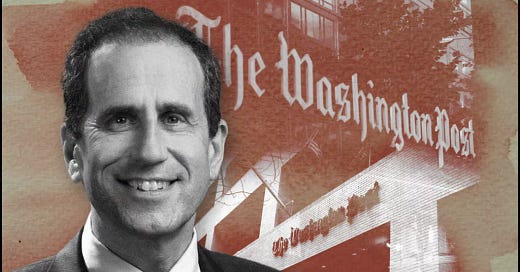Campus Grievance, 'Latinx', and the Coming Show-Me State Circus
Plus, remembering Fred Hiatt.
Recently at The Bulwark:
SONNY BUNCH: Against ‘Latinx’
CHRISTIAN SCHNEIDER: Professors Are Victims of Campus Grievance Culture, Too.
THOMAS LECAQUE: As Grifters Squabble, QAnon’s Bloodlust Gets More Open
CHARLIE SYKES: The Crushing of Peter Meijer 🔐
JVL: Peace for Our Time 🔐
You can support The Bulwark by subscribing to Bulwark+ or just by sharing this newsletter with someone you think would value it.
BEN WITTES remembers Fred Hiatt, the Washington Post, and America’s Moral and Political Seriousness.
Not everyone who creates the sausage that is news and opinion is a household name. You typically never hear about the people behind the scenes unless they’re, say, a Tucker Carlson producer who is discovered to be a racist. Even then, you forget them. But people like Fred Hiatt, may he rest in peace, are the good guys that make the good places function well. In short, they’re worth remembering, if even for a moment. Ben Wittes’s remembrance is well worth your time.
The Post editorial page is a unique institution in American life and letters. It is not an ideological organ like the New York Times, which has traditionally represented the orthodoxies of moderate liberalism, or the Wall Street Journal, which has historically positioned itself as the vanguard of the conservative movement.
It is also not a partisan organ. While the Post has not endorsed a Republican for president since Dwight Eisenhower, it does not reflexively endorse Democrats either. It refused to endorse Mike Dukakis in 1988, for example. And it regularly takes positions highly offensive to Democratic party interests and sensibilities. The page’s support for the Iraq War and its general comfort level with an activist foreign and military policy is but one example of this. Another, which involved me very personally, was the page’s support throughout the Bush administration for judicial nominees Democrats were actively opposing.
For us, this was a simple matter of principle. During the Clinton administration, we had taken stands in favor of fair treatment of lower-court judicial nominees. Unlike the Times and many Democrats and activists, we had actually meant it when we said that the Senate should treat nominees fairly and give them votes on their merits within reasonable periods of time. And we weren’t going to change our view just because President George W. Bush was now the one making nominations. Fred was a rock of support for this consistency, for which we took a great deal of heat. There are countless other examples in the policy arena, in the political arena, and in foreign policy.
In many ways, the Post’s editorial page—to me, it will always be just “the page”—is more of a think tank than a traditional editorial page. And it’s a think tank of an exceptionally high caliber. For a time, when I was there, Fred would preside over a daily meeting with Soviet historian and public intellectual Anne Applebaum, economics writer and expert Sebastian Mallaby, foreign policy guru Jackson Diehl, legal and domestic policy analyst Ruth Marcus, and foreign policy and legal writer Charles Lane. I don’t think I had any appreciation at the time of what a privilege it was to read the newspaper and argue with this cadre of intellectual powerhouses every day and to try to form a coherent joint position with them on issues ranging from the great questions of war and peace to whom we should endorse for state senate in Fairfax County.
If the attorney general wants to restore norms at the Justice Department, he's got to talk about it. He's got to give speeches on democracy, voting rights, and accountability. He has to sell the message. Ben Wittes joins Charlie Sykes on today's podcast.
Brian Katulis of the Middle East Institute and Center for American Progress joins Eric and Eliot to discuss public opinion and foreign policy, the lack of support for policies of "restraint" in polling, American exceptionalism, connecting policy debates to the concerns of everyday Americans, the deficiencies of the Biden Administration's "technocratic managerialism" and the need for a new inclusive narrative to frame strategic competition with China.
I write today about the MAGA mania in Missouri, soon to probably be America’s craziest primary (after my native Ohio, of course.)
With a slight lead in the polls is Attorney General Eric Schmitt, who took over Josh Hawley’s old job. Once upon a time, he was supposed to be the sane candidate in the race. But then Schmitt joined Texas in trying to overturn the 2020 election, filed a class action lawsuit to prevent mask mandates in public schools, and pulled prosecutors from crime cases in an attempt to not help enforce federal gun laws.
But wait, there’s more!
Schmitt also filed suit against the Biden administration to build the wall (don’t worry that MAGA thinks it was already built; consistency, hobgoblins, etc.). And he sought to get charges against his opponent Mark McCloskey and his wife dismissed. (Don’t worry, they got pardons.) Schmitt is so all-in that he’s suing both the Chinese government and the Chinese Communist Party. Good luck with that, counselor.
But even with all of that, Schmitt has another candidate nipping at his heels.
Eric Greitens.
You may remember Eric Greitens as Missouri’s disgraced former governor. And Lordy, is he something.
Read the rest of the crazy Greitens stuff here.
🚨OVERTIME 🚨
America is amazing. A thread about a rescue in Niagara Falls, New York.
The destruction of norms continues…

Your weekend breakfast recipe. As narrated by an English chef who sounds like Winnie the Pooh. Panackelty looks like my jam.
Beware the holiday party. A NYC biglaw firm had an outbreak.
Will normal people without a license fly anytime soon? Probably not, but technology is getting is closer.
An elegy for conservatism… David Brooks at The Atlantic. Read the whole thing, but here’s a taste:
What passes for “conservatism” now, however, is nearly the opposite of the Burkean conservatism I encountered then. Today, what passes for the worldview of “the right” is a set of resentful animosities, a partisan attachment to Donald Trump or Tucker Carlson, a sort of mental brutalism. The rich philosophical perspective that dazzled me then has been reduced to Fox News and voter suppression.
-30-
Editorial photos provided by Getty Images. For full credits, please consult the article.








